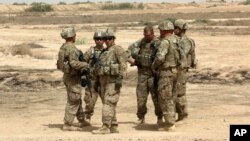Before his order sending hundreds more members of the U.S. military to train and advise Iraqi forces in the battle against Islamic State extremists, President Barack Obama acknowledged there are not enough Iraqi army recruits.
Facing a dangerous and nimble foe, Iraqi forces have repeatedly stumbled, ceding major cities — Mosul last year and recently Ramadi. Still, the State Department claims there is “a lot of interest” across Iraq to take on Islamic State — just not all with the Iraqi military.
There are other militia willing to confront the Islamic State's forces, U.S. officials say.
“If we switch from the Iraqi army to the Popular Mobilization Forces [PMF], there are Sunni volunteers currently being trained by the Iraqis. About 1,000 Sunni fighters were inducted into the Popular Mobilization Forces at the end of May,” said State Department spokesman Jeff Rathke.
“They joined thousands of other Sunni volunteers who have already joined this program and are fighting side by side with Iraqi Security Forces,” he added.
Empowering militias
The Popular Mobilization Forces are a loose alliance of Iranian-backed Shia fighters and other volunteers, including Sunni militia. According to a State Department official, the Sunnis are being paid by the Iraqi government, but do not fall under Iraqi military authority.
In some cases, according to analysts, the Iraqi military takes a secondary role to the militias.
“In Baghdad, [Iranian General Qassem] Suleimani has already organized the defense of the city, relying heavily on the militias, with the ISF largely being in support,” explained Gareth Stansfield, professor of Middle East politics at the University of Exeter in Britain.
Michael Rubin, a former Pentagon official now with the American Enterprise Institute, said one of the reasons recruits prefer to join the mobilization forces is ease of entry.
“The volunteers undergo much quicker training and do not make the career commitment to the army,” Rubin said.
Many Shia are joining the PMF instead of the military for similar reasons, said Douglas Ollivant, a senior fellow at the New America Foundation who served in Iraq.
“When I talk to them, they tell me it’s really a rational choice,” Ollivant said. “They don’t want a three-year hitch with the army, nor do they want to be police.”
Alternate tack
The Popular Mobilization Forces are the alternative.
Ollivant also is a partner with Mantid International, a group with commercial interests in Iraq.
The White House calls the 450 new U.S. soldiers "advisors" who “will work to build capacity of Iraqi forces, including local tribal fighters.” It was not immediately clear if these tribal fighters would fall under the authority of the Iraqi military.
A Defense Department official told reporters the soldiers will "provide immediate advice" to Iraqi army regulars on logistics, operations and intelligence and "begin to facilitate the connections between the Sunni tribes in Anbar [province] and the Iraqi government."
Patrick Skinner, director of special projects at the Soufan Intelligence Group, said that notion could expand the view of whom to train.
“I think it’s almost a recognition that there is no effective Iraqi national army, and unlikely to be one in the near term,” Skinner told VOA. “It is also a tactical admission that the Sunnis are not going to be absorbed in any significant numbers into the actual Iraqi army.”
Analysts say the concern with having different armed groups fighting in Iraq is what happens to them after the battle is over.
“The idea about how to demobilize the volunteers is a growing concern, especially those that do believe they should have a reward for their sacrifice,” said Rubin.
What Iraq could end up with, said Skinner, is a lot of local warlords with a lot of weapons and differing goals. “Then you have Afghanistan.”
VOA's National Security correspondent Jeff Seldin contributed to this report.





